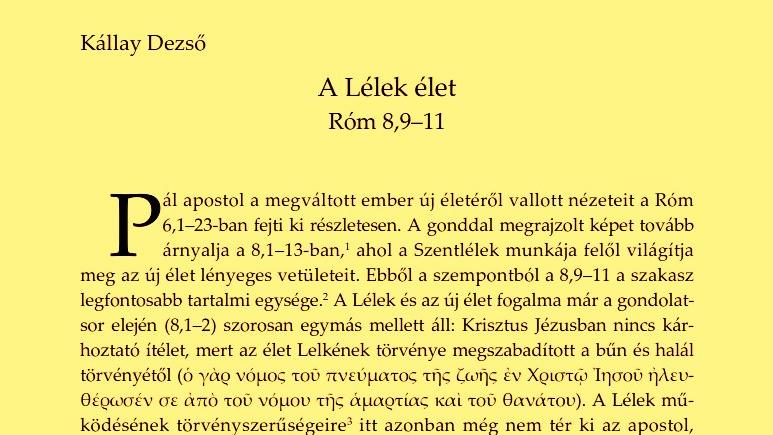Beszédművészet
Fejezetünkben három kérdéskörrel fogunk foglalkozni: légzéstechnikával, a kiejtés problémáival és a beszédhibákkal, illetve azok kijavításával.

Fejezetünkben három kérdéskörrel fogunk foglalkozni: légzéstechnikával, a kiejtés problémáival és a beszédhibákkal, illetve azok kijavításával.
Ennek a témának alig van irodalma. Sem az egyházi, sem a társadalmi tudományos élet nem foglalkozott behatóan az egyházak és a nemzetállam viszonyának a közép-európai nagy változások óta kialakult helyzetével, történelmi eseményeket formáló szerepével. Mintha mindkét oldal várakozó álláspontra helyezkedett volna, s a váratlanul kialakult helyzetben ezek csupán a tényleírásra vagy helyzetfelmérésre vállalkoznának.
A mögöttünk levő évtizedek református teológiai munkásságának kritikai feldolgozása a mai nemzedék számára elvégzendő feladat. Ahhoz, hogy ez ne a "bűnbakkeresés" mechanizmusa legyen, hanem katarzist adó szolgálat, valóban teológiai munkát kell végezni. Teológiát csak teológiai kritériumokkal lehet mérni. Fontos teológiai aspektusra mutat rá Török István Barth nyomán, amikor egyfajta krisztológiai herezist lát megjelenni az ősi hitvallást — Jézus Krisztus Úr — kiegészítéssel ellátó teológiai vonalvezetésben.
A tanulmány célja, hogy átfogó képet adjon a teremtéstörténet értelmezésének történeti és eszmetörténeti változásairól, valamint a zsidó és keresztény gondolkodás közötti kapcsolódási pontokról. A tanulmány öt fő területet tárgyal. Elsőként a bibliai teremtéstörténet és az ókori Kelet mítoszvilágának összefüggéseit mutatja be, különös tekintettel a motívumok és narratív struktúrák párhuzamaira. Ezt követően elemzi a „semmiből való teremtés” (creatio ex nihilo) és a meglévő anyagból való formálás zsidó gondolkodásban betöltött szerepét a talmudi irodalomtól a modern korig.